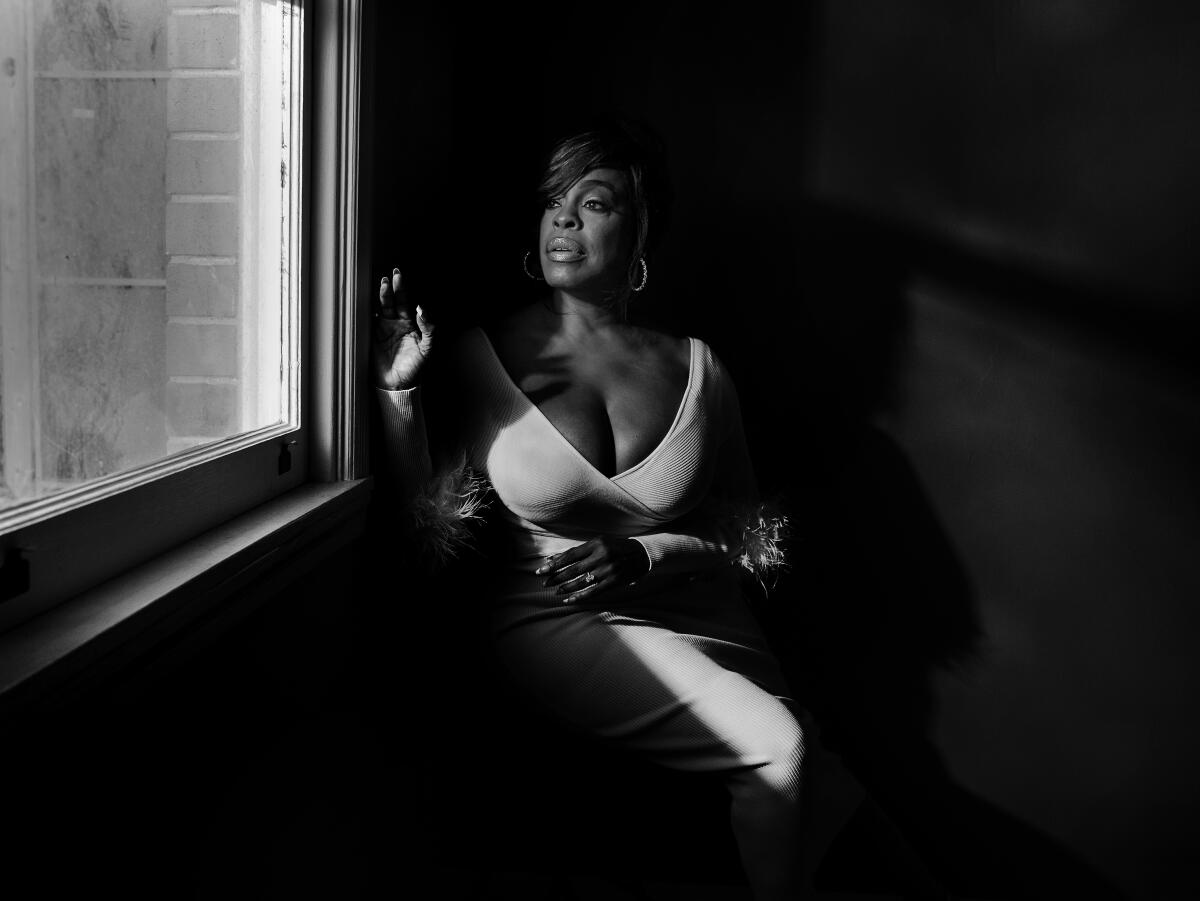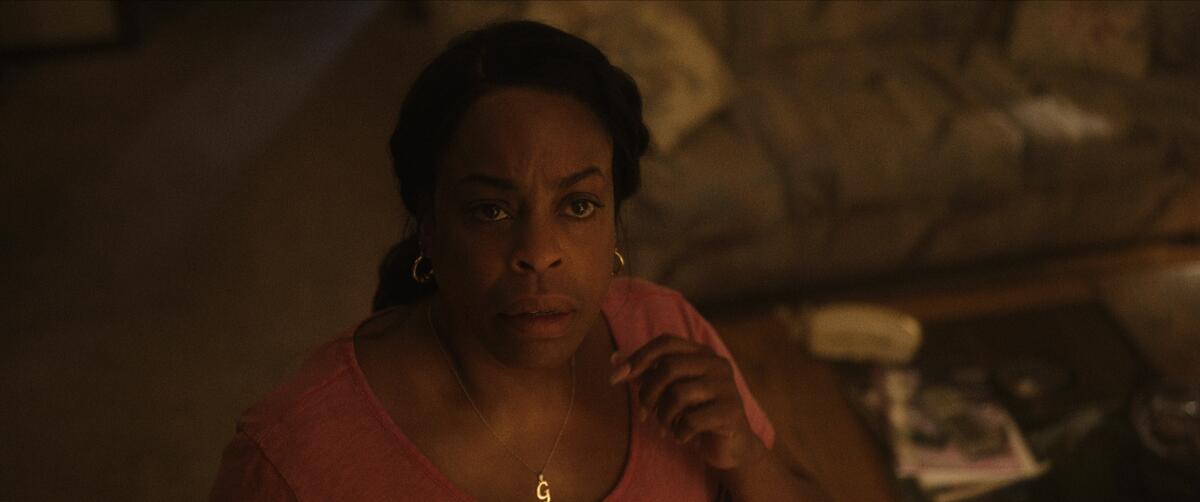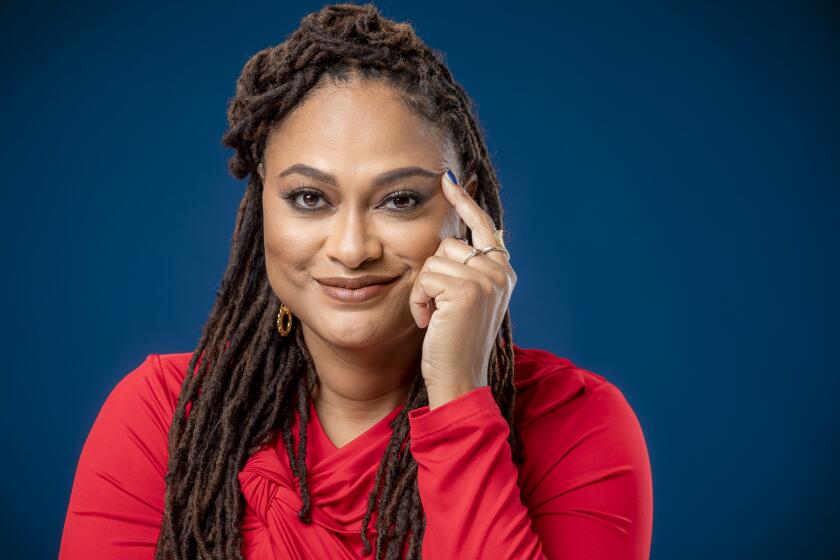Why Niecy Nash-Betts knows being ‘unheard and overlooked,’ like her ‘Dahmer’ character

- Share via
It was the worst date Niecy Nash-Betts can remember. At the time, she was a young person eager to break free of Compton and forge a career in entertainment. Unfortunately, the guy she was with was getting a little too handsy and needed to be taught a lesson.
“He was not going to take no for an answer and I knew it. I was alone and I was afraid and I feel like I became an Academy Award-winning actress in that moment,” she recalls. “I knew how to projectile vomit. That’ll bring it to a quick halt. And one, two, three, there you have it, all over everything. And he was like, ‘Get out, get out.’ And I was like, ‘Geez, dodged a bullet on that one.”
She’s been dodging bullets ever since. Not real ones, but more like the slings and arrows of naysayers, those who told her to “stay in her comedy lane,” as she recalled in her acceptance speech last month at the Critics Choice Awards where she won for supporting actress in a limited series for Netflix’s “Dahmer — Monster: The Jeffrey Dahmer Story.”
Nash-Betts plays Glenda Cleveland, the hapless neighbor who lived across the street from the notorious serial killer, but in the show resides next door. Besieged by the smell of decomposing flesh and blood-curdling screams in the night, she repeatedly dials 911 only to be ignored by police. In the space of 14 months at the address, Dahmer killed 12 men.

“Glenda and I definitely share that feeling in common of being unheard and overlooked,” Nash-Betts says. “The interesting thing about this version of this story is that that theme is timeless. We’re still in spaces and places where it resonates today where people are being overlooked and over-policed at the same time.”
Not only did the police overlook Cleveland’s complaints, they were occasionally complicit, returning sedated 14-year-old victim Konerak Sinthasomphone to Dahmer after he’d escaped, believing the two were merely in a lovers’ spat. In reality, Cleveland wasn’t on the scene that night but her daughter was. Also fictional is the chilling scene in which Cleveland’s complaint to the building’s super results in Dahmer’s eviction. In an effort to get her to recall the complaint, the killer pays her a visit bearing a sandwich consisting of a mysterious-looking meat.
“Evan and I had been doing this dance for a while. So, the fear, the anxiety, the pain had already been baked in. This scene was just putting the cake in the oven,” she says of working with Evan Peters, who won a Golden Globe for his portrayal of Dahmer and, like Nash-Betts, is nominated for a SAG Award.
‘It was something that I wasn’t really planning on doing,’ the actor says. But he found the Ryan Murphy script too compelling to pass on.
“That was tough because you want to appear in front of Evan’s character like you are completely unafraid and so flatfooted in what you’re doing and how you’re doing it. But you need the audience to know that I’m scared to death,” she says of the scene, a protracted two-hander that brims with mortal tension. “I couldn’t ask for a better scene partner to unpack that material with. This was by far one of the hardest performances that I’ve ever had to do.”
And she’s done a lot. She played author Richie Jean Jackson in Ava DuVernay’s “Selma,” and traumatized mother Deloris Wise in DuVernay’s TV series “When They See Us,” just two of her many dramatic roles. Nash-Betts spent most of her career in comedy, first in stand-up and later slaying them in such comedic shows as “Reno 9-1-1,” where she plays vainglorious Deputy Raineesha Williams, and “Claws” in which she stars as murderous manicurist Desna Simms.
Ava DuVernay, writer-director of ‘When They See Us,’ wanted to honor the five teenagers who were wrongfully convicted of beating and raping a woman
Currently, she plays rookie agent Simone Clark on “The Rookie: Feds,” opposite her real-life “hersband,” Jessica Betts, whom she married in 2020. It’s Nash-Betts’ third marriage, her first to a woman.
“When it comes to matters of the heart, all bets are off because the heart wants what it wants,” she says, reflecting on their relationship. “People who really know me and know that I’m such a lover of people and I’m in love with love, may have been a little less surprised than people who don’t know me. But my only responsibility is to live my truth out loud and flatfooted. My responsibility is not to try to manage how other people see that part.”
Once pigeonholed as a comedian, she’s finally proved to the industry that she can do it all. She attributes her success to hard work, intuition and the favor bank. “I’ve never gotten a job and not gotten somebody else a job. And I think the reciprocity of the universe just continues to bless me because I always try to be a blessing to others.”
And to those who advised her to stay in her lane, she had this to say at the Critics Choice Awards: “To everybody who doubted this Black woman and told me what I could and couldn’t do, I want to say… In your face!”
More to Read
From the Oscars to the Emmys.
Get the Envelope newsletter for exclusive awards season coverage, behind-the-scenes stories from the Envelope podcast and columnist Glenn Whipp’s must-read analysis.
You may occasionally receive promotional content from the Los Angeles Times.












